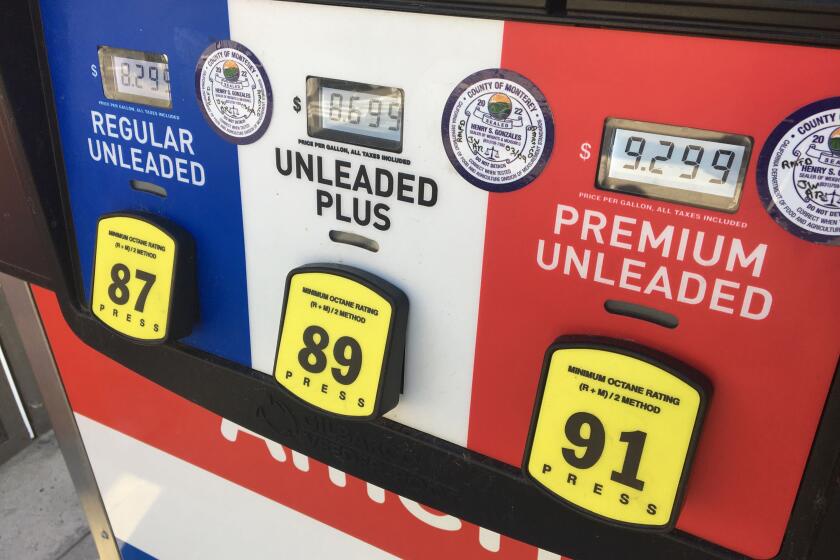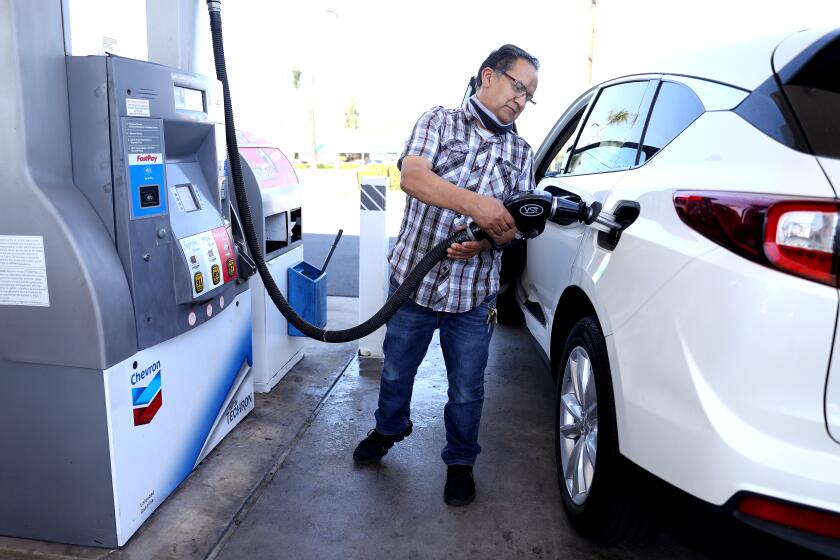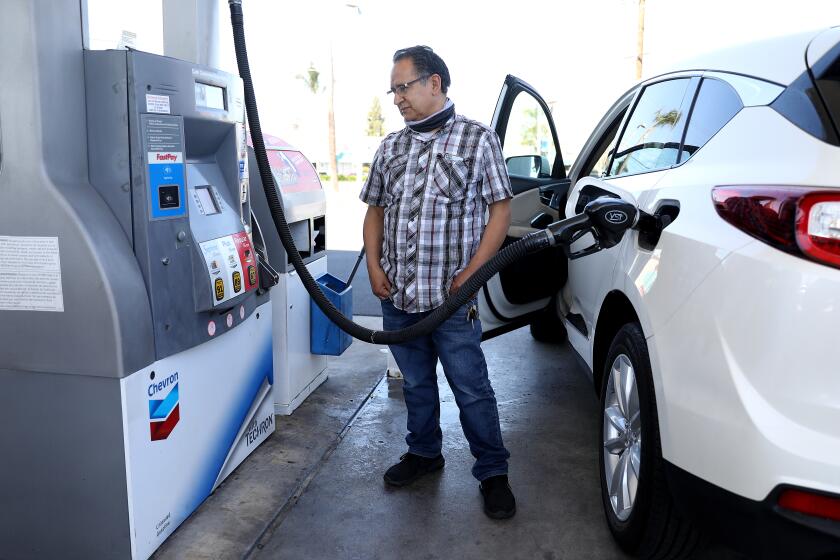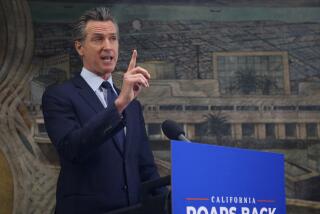Should both the rich and poor in California receive $400 gas tax rebates?
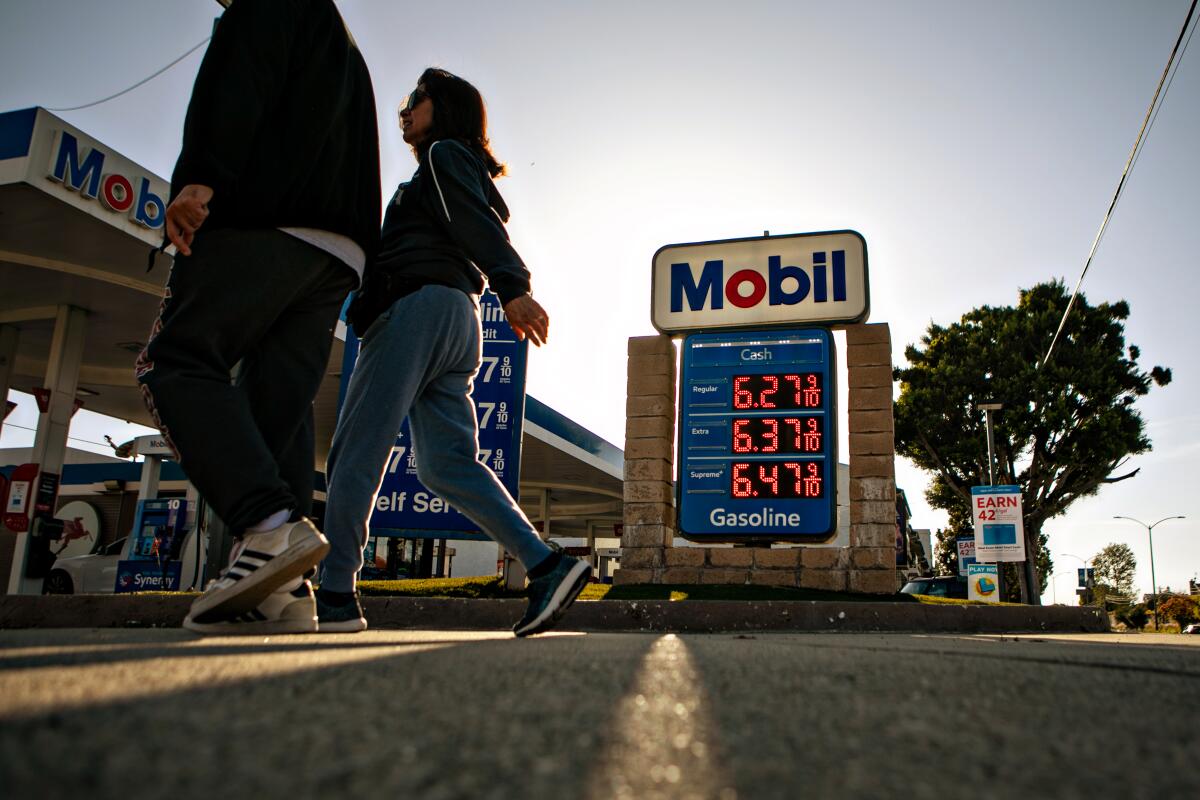
SACRAMENTO — In a state that is home to the nation’s highest poverty rate, the most billionaires and a shrinking middle class, who deserves cash relief when prices are soaring?
That question is at the center of ongoing discussions inside the state Capitol as California grapples with a surge in gasoline costs and is projected to have a record-high budget and surplus.
A group of Democrats is proposing sending a $400 rebate to every California taxpayer regardless of income or whether they own a gas-powered car. Republican lawmakers have pushed for a suspension of the gas tax, an approach they say would mean faster relief and less negotiations. Gov. Gavin Newsom made a vague promise to “put money back in the pockets” of Californians but has backed off on a pitch to tie rebates to vehicle ownership.
On Friday, Democratic leadership delivered another proposal that would give Californians at least $200, increasing that amount based on their number of dependents. That plan would include households making up to $250,000 but would exclude Californians making higher incomes.
While a universal checks-for-all program is likely to be well-received by the general public, lawmakers have to decide how far to stretch potential funding as they track revenue in the coming months, along with the best way to address the hierarchy of California’s many needs.
Advocates across the state say that relief should begin with more for those who need it the most instead of an equal share for all.
Assembly Speaker Anthony Rendon (D-Lakewood) said he supports a plan that gives more to low-income Californians, noting the state’s vast wealth gap.
“That’s exactly the type of thing I’m in favor of,” Rendon said in an interview with The Times on Wednesday. “Providing direct checks to CalWorks recipients or even sending a check to tax filers of a certain level — all of those are the type of things that could be great.”
A proposed $400 tax rebate to help Californians deal with high gas prices draws support, but don’t expect to see any checks in the mail next week.
Rendon said in a statement Thursday that the $400-for-all plan “eliminates some of the pitfalls of other proposals such as a gas tax holiday,” which Democrats have said would not help consumers as much as a cash payment they can spend on groceries, rent and other necessities. Democratic legislators also support a plan that is not specific to drivers, citing climate concerns.
The speaker said the latest plan, spearheaded by Assemblymember Cottie Petrie-Norris (D-Irvine), “shows Californians that the Legislature aims to have their backs.” But he also said Wednesday that he would not support a proposal to send checks to the very wealthy, naming as an example Los Angeles-based billionaire philanthropist Gary Michelson, whom he called a friend.
“[Michelson] is a sweetheart of a man, but he doesn’t deserve a check either,” Rendon said. “A lot of people have suffered recently. A lot of Californians have been struggling, and we’re looking for a solution to provide financial support for those Californians in particular.”
Senate President Pro Tem Toni Atkins (D-San Diego) said earlier this week she’s pushing for “substantial relief, especially for lower- and middle-income Californians” and “not just those who are drivers.”
Under a plan revealed Friday, an estimated 90% of taxpayers would receive a $200 refund, according to the proposal. The plan would also provide an additional $200 for each dependent, aiming to help larger families facing higher costs.
Immigrants without legal status and low-income Californians who are not required to file taxes would also receive refunds under the plan.
A new report by the nonpartisan Public Policy Institute of California found that higher-income families spend more on gas and would receive the largest benefit of any gas tax rebate or tax holiday.
Republican lawmakers voiced support for the $400-for-all plan but are still pushing for a gas tax cut in addition to a rebate. They argue that all taxpayers deserve a cut of the state’s flush budget, especially as the wealthiest contribute more in taxes.
“It’s a common-sense response,” Assemblymember Kevin Kiley (R-Rocklin) said at a news conference Thursday. “We have this surplus, what should we do with it? Maybe we should return it to the folks that we got it from.”
Mike Herald, director of policy advocacy for the Western Center on Law & Poverty, sees the fairness question differently.
The price of gas is the same for everyone, even as incomes vary, he said. While some living in poverty cannot afford to own a car, low-income Californians are less likely to have an option to work from home during the pandemic, and a car is a lifeline.
“We do things like this a lot, where we enact policies that have a disproportionate impact on lower-income folks and then when we get into these kind of crisis situations, we don’t always make sure that the folks that are already paying too much are the first ones to get relief,” Herald said.
Questions about equity have placed Democrats pushing the universal rebate plan in a tough spot.
The hesitation to tinker with California’s steep gas excise tax of 51 cents per gallon demonstrates just how politically sensitive the issue remains.
Assemblymember Jesse Gabriel (D-Encino), who touted the $400 universal plan, said it doesn’t have to be a rebate for all or a rebate only for low-income residents — it can be both.
“The size of the surplus allows us to do both,” Gabriel said at a news conference Thursday. “This is not going to be the only proposal on the table. This is not the only thing we’re going to be able to do.”
The current proposals would have further reach than the governor’s “Golden State Stimulus” pandemic relief model from last year, which only benefited tax filers earning up to $75,000 a year.
According to poverty measures adjusted for California’s cost of living, middle-class income for a family of four renting in Los Angeles County could reach more than $227,605 and up to $261,623 in parts of the Bay Area.
“We know of course [the $75,000 limit] is not high enough to be middle class in many parts of the state, and I suspect that’s part of the tension that the administration is focusing on — trying to address that there are low-income Californians that are affected very negatively by rising costs but also middle-income Californians challenged by the state’s cost of living,” said Chris Hoene, director of the California Budget & Policy Center. “The reality is there’s lots of different ways that folks with different incomes struggle to get by in this state.”
Hoene, whose group advocates for programs aimed at the state’s lowest-income residents, called the Golden State Stimulus “well structured” though, and said his primary concern is cutting into the state budget to benefit the wealthy.
“What we want to try to avoid is, in essence, wasting the state’s resources by giving the credit to Californians who aren’t in need at this time,” he said.
Newsom administration officials said details on his tax rebate plan will come next week, and pointed to preexisting initiatives that are “focused on improving affordability,” including state-funded healthcare and child care.
“The governor is committed to bringing real relief to struggling Californians. We are working on a proposal that helps Californians with rising gas prices and provides funding to public transit so they can provide direct relief for riders,” spokesperson Erin Mellon said Thursday.
More than a third of Californians are living at or near the poverty line. At the same time, almost 1 in 4 tax returns filed in 2019 came from taxpayers with an annual adjusted gross income of more than $100,000, according to data compiled by the state Franchise Tax Board.
Families in the state’s lowest income bracket spend a larger portion of their budgets on gasoline than other income brackets, according to the PPIC report. Middle-income families also spend more of their budgets on gas than high-income families, according to the report.
Sarah Bohn, an economy and poverty researcher for the institute, said a more targeted approach for the lowest-income families is best, but a check for all would likely be easier for the state to administer — and some middle-class Californians who do not qualify for public assistance could also use the help.
“The ideal way to do it, in my view, is to target those who are really burdened by higher prices and haven’t seen rising earnings as much as other groups. But it’s difficult to do; we don’t have a lot of mechanisms for that,” Bohn said. “Many middle-class families are actually spending most of their resources on basic things in their budget and then they don’t have a ton left over.”
The discussion over rebates has sparked a slew of debates about the type of changes to government policy California needs in the face of a record-high budget, with interest groups clamoring for more permanent action instead of cutting one-time checks.
Climate advocates said any reward for gas-powered vehicle owners contradicts California’s environmental goals.
Matthew Lewis, a spokesperson for California YIMBY — which stands for “Yes, in my back yard” — used the moment to urge state officials to rethink housing policy and workers’ dependence on commuting.
“It’s good policy to help lower-income people by giving them money, but honestly if the state wants to get serious about what those people really need, it’s affordable housing closer to their jobs. Giving people gas tax rebates won’t solve this problem,” he said. “This is a climate policy. The amount you charge for gasoline is a climate policy, so let’s treat it that way.”
Gas prices are high across California, and it’s unclear when prices will go down. But, there are ways to save money on gas. Here are some tips.
More to Read
Sign up for Essential California
The most important California stories and recommendations in your inbox every morning.
You may occasionally receive promotional content from the Los Angeles Times.
